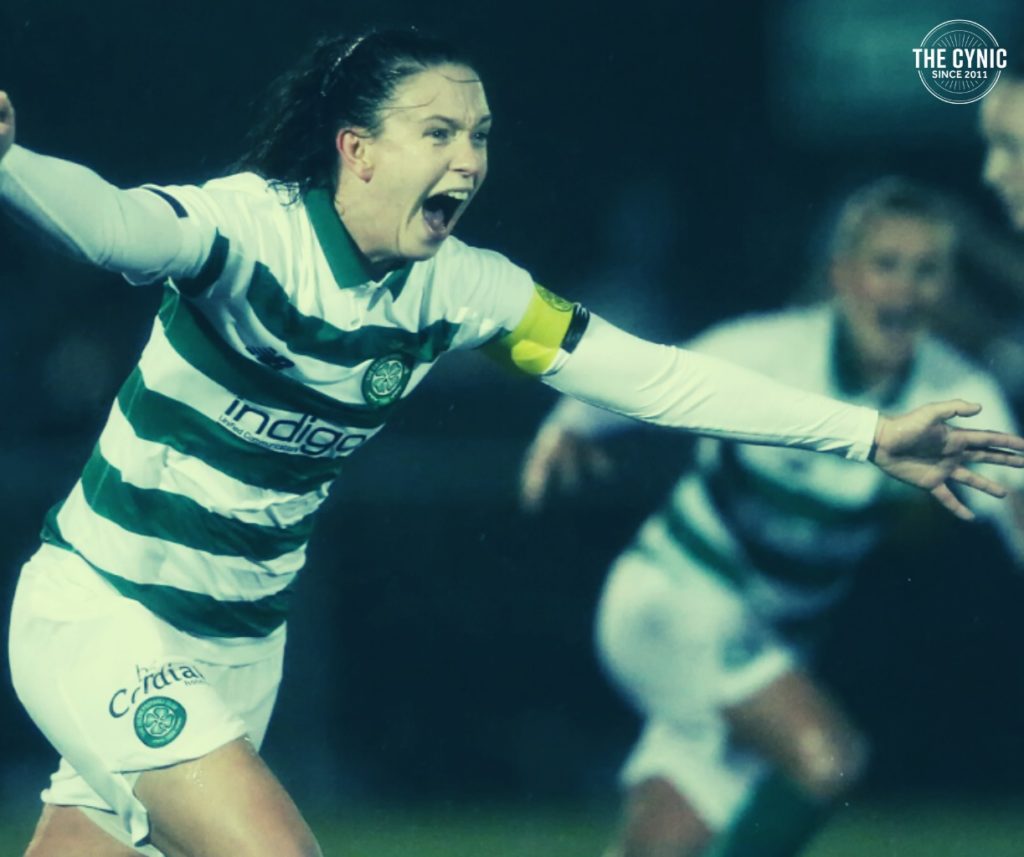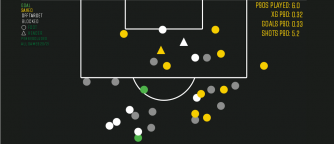February 21 2020, soaked to the skin on concrete terraces amidst freezing sideways rain watching Kelly Clark score the winner against 13 consecutive times league champions Glasgow City was the exact moment I fell in love with women’s football. More specifically with Celtic FC Women, a team with something of a chequered history but, with the right stewardship, a very bright future.
I had been to women’s home games the previous year and enjoyed the different atmosphere and getting to know the team and opposition but I would hazard a guess that many of us have football memories that are imprinted on us for all time and which serve as milestones in our own stories of football fandom. That Kelly Clark goal and the reaction to it was absolutely one of mine. My own journey as a Celtic fan was in its infancy and discovering that I could expand my Celtic supporting horizons; that more emotions of excitement, anticipation and disappointment were there to absorb only served to solidify my love of the club.

Of course, sitting amongst a handful of supporters in all weathers next to an astro pitch in East Kilbride on a Wednesday night in winter is a vastly different experience from walking into a packed Celtic Park to cheer on the men’s first team. However, I soon discovered that the differences make it no less thrilling to watch a team wearing the green and white hoops. In fact, watching the players up close, seeing the coaching staff interact with them and enjoying the spectacle of youngsters from the girl’s academy watching footballers in serious competition and knowing that that could be them one day only serves to add new dimensions to the ways in which you can love a football club.
Prior to that momentous February night, my interest in the women’s side had been further heightened following the unveiling of new manager, Fran Alonso at the start of 2020. I attended the press event representing The Cynic for his introduction and the launch of the professional women’s side, interviewing the manager and some of his players about their hopes for the team over the coming season. It was clear even then that something interesting was happening and I and The Cynic absolutely wanted to play a part in it.
Alonso’s appointment marked a new era for Celtic FC Women, with players signing professional contracts for the first time under a manager with a distinguished pedigree, having worked under the likes of Ronald Koeman at Everton and Mauricio Pochettino at Southampton. It appeared to signify a shift in the club’s attitude to the women’s team, an attempt to compete in a global footballing environment where the women’s game was, and still is, growing at pace.
Not only did he come with a huge amount of experience in both men’s and women’s football in England, but Alonso was clearly, from the outset, a manager with a distinct vision of what he hoped to achieve at Celtic and how he hoped to achieve it. His ambition and clarity of purpose shone through in his initial interviews with the press and he has gone on to prove himself by achieving arguably the team’s most successful season to date finishing just three points off Glasgow City at the top of the table.
That success, however, has been achieved off the back of working through a pandemic that has had a severe impact on all sporting endeavours for over a year. When the pandemic hit there were immediate fears that momentum would be lost, that the inability to continue the league season in which Celtic had made such a powerful initial impact under Alonso would signal stagnation or, even worse, regression in terms of the energy and resources being put behind the women’s team. However, despite setbacks, this Celtic squad has proved resilient in the face of adversity. Alonso, his coaching staff and the players have been able to navigate the choppy waters of a stop-start season, challenges with access to facilities, training in isolation as well as the more routine issues with injuries and changes in personnel.
Reflecting on this, it’s my belief that this has been achieved through a myriad of factors starting with the retention of that focus and ambition that was so clear from Alonso upon his appointment. It’s an ambition communicated through an infectious energy and passion for the game that has clearly translated to his players and staff, a difficult energy to maintain through extremely challenging periods of extended downtime. He also has a very clear vision of how he wants to play, a dynamic and attacking style of football that fits into the traditional Celtic mould.
Alonso’s squad also clearly benefits from an emphasis on strong relationships. One of the most joyful things about following Celtic FC Women is witnessing the interactions showing the levels of trust that exists between players both on and off the field. A personal favourite moment as the season drew to a close was Clark making a beeline for friend and teammate Chloe Craig on the subs bench to enthusiastically celebrate another crucial last minute winner against Rangers.
Many of the discussions with my fellow Cynics around the women’s 2020/21 season focused on Alonso’s propensity to switch up teams on a regular basis, to play players out of their natural position and give chances to younger players and academy graduates. It was occasionally frustrating as a fan to try and understand the reasoning behind his squad management. We wanted to see what we thought were our best players on the pitch as much as possible and to win every game as convincingly as possible. However, in a season which drew to a close only though necessary fixture congestion, it became clear that this strategy was bearing fruit as the points racked up and the younger, more inexperienced players grew in confidence and developed the ability to work alongside their more experienced teammates.
This was no more apparent than on the last day of the season when, needing three points against Motherwell, the squad was hit by a Covid breach and key players were forced to isolate and miss the game with only a few hours notice. The fact Alonso had adopted this strategy throughout the season ensured that young players such as Chloe Warrington, Kate Nicolson and Tegan Bowie, who had been allowed to flourish under Alonso’s management, were able to step up and deliver the victory. It was that win which cemented second place in the league behind perpetual victors Glasgow City and secured a Champions League spot.
On 18th August 2021, Celtic FC Women will take on Levante in their first ever UWCL fixture. They go in via the extremely challenging league path very much as the underdogs. Levante finished third in one of Europe’s strongest women’s leagues, the Spanish Premier Division, behind Barcelona and Real Madrid. As a Spaniard and student of the game, Alonso will be well aware of the huge challenge this represents and will be preparing his players accordingly.
At this stage as a fan I am very much hoping for the best and expecting the worst. However, I am extremely excited to watch a fixture that we could have only dreamed of 18 months ago and which hopefully represents a foundation upon which to build further success for Celtic FC Women as a European football club and league title contender.
It is clear that the women’s game has a long way to go before it achieves the status, investment and level of support that comparatively abounds in the men’s game. If anything can prove to the powers that be at Celtic that the women’s team is a huge asset which deserves significant investment, it should be that fact that despite the arguable deficit in experience and investment compared to their closest rivals and following a global pandemic, Celtic FC Women have emerged as a Champions League team for the first time since their establishment in 2008. It is a huge achievement and one that should be relished, celebrated and and built upon for years to come.












Great read and thankyou. The women’s game will move forward this season faster than ever before. Celtic are moving forward at pace and i believe they could compete with the very best within a couple of years with clever investment. The team are treated well and there is a togetherness in the camp. Win or lose this European experience some players will gain will only contribute to them becoming better players. Onwards and upwards.